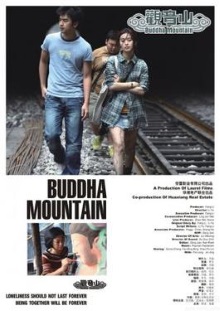
We currently watch so many films that occasionally we do forget that we’ve already watched something. This is one of those times. Neither my wife nor myself could remember watching this but it seemed familiar as we started watching it. Oddly enough, I do definitely remember watching the earlier and better known Lost in Beijing by the same director and also starring Fan Bingbing. Still, this must have been before I started writing about films extensively and I like to think that my ability to properly evaluate and appreciate cinema has improved since then so rewatching it was fine.
Nan Feng, Ding Bo and Fatso are a trio of close friends who have skipped out on university and instead work odd jobs for a living. They rent rooms together from a landlady called Chang but their relationship with her is initially acrimonious. The former opera singer’s daily routines mesh poorly with that of the three youths who work nights and sleep late. One evening while performing as a singer in a pub Nan Feng accidentally injures a customer who demands compensation. While rifling through the room of Chang’s deceased son, Ding Bo comes across a large amount of cash and gives it to Nan Feng so that she can keep her job. They also realize that Chang is having a hard time dealing with her son’s death. After they save her from a suicide attempt their relationship slowly improves. Meanwhile the youths also deal with their own issues with their parents and Nan Feng and Ding Bo’s attraction to each other.
As with Lost in Beijing, the film is shot in an aggressively hip and modern style with a very kinetic hand-held camera. This energy however is balanced out by the tranquility of the underlying Buddhist theme exemplified by the character arc of Chang and visualized in the form of a desolate shrine perched precariously on a cliff. So you have scenes alternating between alcohol-fueled parties with neon lights and loud music and scenic shots of the countryside, seen from the back of a whizzing train, with the youths enjoying both as if to say that all this is part of life. The film certainly excels in capturing their YOLO attitude and it’s rather edifying to have the filmmaker portray them as living mostly satisfying lives despite the fact that their non-standard lifestyles deviates a fair bit from the socially approved university education to corporate career path.
Unfortunately while director Li Yu has an excellent handle on the themes that she wants, the execution is riddled of flaws. One problem is that Sylvia Chang as Teacher Chang is so much better than the other performers that it gets rather glaring. Fan Bingbing is competent of course though I believe that she is too beautiful and too made-up for the role. What grates is Cheng Bolin as Ding Bo who I’m sure tries his best but is just awkward in scenes with the other two. One scene in which Chang tries to teach Ding Bo a bit of opera singing is cringey because she might as well have been acting opposite a wooden post. A consequence of this is that the film has excellent montages, contemplative, fleeting shots with no dialogue at all but is weaker when characters actually have to engage one another in conversation. I feel that the film cheats a bit by having important character-building moments happen off-screen during the montages. It’s weird for example that the youths can borrow Chang’s car without permission and steal her money without consequence because the disagreements are all smoothed over off-screen.
Overall I still quite liked the film although the experience of rewatching it while only having vague memories of it was a bit distracting. I do like what the director seems to be doing however with her films about the lives of young people in modern, urban China that don’t quite fit in with what the Communist Party expects out of them. I notice that Fan Bingbing has been four in these so far and I wouldn’t mind watching more of these some time down the road.